Population won’t spike: govt

A baby sits in a pram on Tiananmen Square in Beijing on Sunday. On Friday the Communist Party of China announced an easing of the country's controversial family planning policy as part of a raft of sweeping pledges including the abolition of its re-education through labor system and loosening controls on the economy. Photo: AFP
China's population of 1.35 billion will not see a major spike after the country relaxes the family planning policy to allow couples to have two children if one of the parents is an only child, authorities said on Saturday.
The new policy, disclosed on Friday in a comprehensive reform plan by the Communist Party of China Central Committee, is seen as a breakthrough in the controversial one-child policy adopted in the 1970s to contain the soaring population.
Wang Pei'an, deputy director of the National Health and Family Planning Commission (NHFPC), said a sudden growth of population is unlikely, as the number of couples that the policy applies to is not very large, and as different places will implement the policy at different pace according to individual situations," Wang said.
The policy tends to have bigger impact on urban citizens as there have been more only children in cities than in the countryside, as having a second child is allowed in rural areas in most provinces if the first child is a girl.
Wang noted that the change will not put much pressure on food supplies or public services. More people may want to have a second child in the coming few years, but this surge will only equal that around the year 2000, he said.
Beside, in the past the government has been designing food and other accommodating policies based on expected peak population of 1.5 billion in 2033. Even with the relaxing of family planning policies, the peak population is largely expected to be smaller than 1.5 billion, Wang said.
Twenty years ago, the country's total fertility rate already fell below 2.1, the international standard to keep the population level. The rate has kept falling to below 1.5 now, according to official statistics.
The announcement of the new policy has drawn heated public discussion, with some excited about the greater freedom to make a choice and others cautious of having a second child.
An online survey by ifeng.com showed more than 63 percent of respondents want to have a second child and about 30 percent said no because of the high cost of raising a child. The survey had more than 190,000 respondents by Sunday afternoon.
Some doubt that even those who said they want a second child may not really put it into reality.
"It's still in doubt whether fertility desire can be realized as people have various concerns such as education costs," said Lu Jiehua, a professor of social demography at Peking University.
Local regulations on family planning should be amended based on the national Population and Family Planning Law, said Wang of the NHFPC, noting that there's no unified timetable nationwide.
Wang explained that the new policy helps to sustain a reasonable scale of labor force and slow down the aging population, and strengthen families' function to take care of the aged, as well as stabilize the birth rate at a moderately low level.
The earlier one-child policy limits most urban couples to one child. The policy was later relaxed so if both parents were only children they could have a second child regardless.
The falling birthrate which resulted, however, has thrown the growth of the aging population into sharp focus and led to shrinkage of the working-age population.
China has seen its labor force drop 3.45 million in 2012 from the previous year, the first absolute decrease in recent years, and is expected to decrease a total of 29 million in 10 years, according to the NHFPC.
The elderly population aged 60 and above, meanwhile, has grown to nearly 200 million, 14.3 percent of the total population, far ahead of the international norm of 10 percent. The figure is forecast to exceed one third of the population by 2050.
Zhang Yongjun, a research fellow at the China Center for International Economic Exchanges, told the Global Times that the new policy would help to make the population younger, but the contribution to demographic dividend and the increase of labor force would not be significant, as the idea of fewer and better births have been rooted in urban residents' minds after all these years, and the increasing cost of raising a child is also a big concern.
The announcement said it is not time yet to apply two-child policy to all couples, as a possible population hike could cause pressure on public services.
But Lu believed that if the new one-child policy is stably implemented and does not cause high fertility rate, the country would take the next step to adopt a looser policy more quickly.